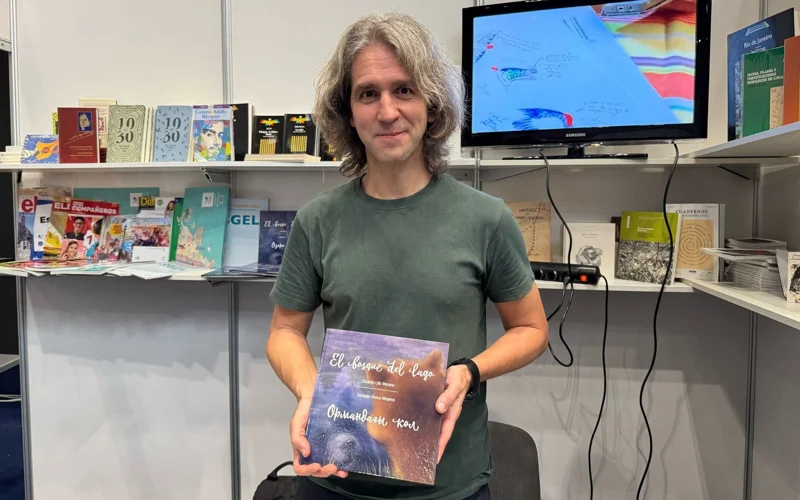The Bear, the Lake, and the Lesson: A Spanish Tale debuts in Kazakh and Russian
Spanish author Eduardo Lillo Moreno presented his children’s book El bosque del lago to local readers at the Eurasian Book Fair in Astana. In an exclusive interview with Kazinform News Agency, he spoke about the story’s message, its translation into Kazakh and Russian, and the significance of sharing it with young audiences in Kazakhstan.

El bosque del lago marks Eduardo Lillo Moreno’s debut in children’s literature. The book tells the story of Xuso, a curious young bear who ventures into a forbidden lake and discovers what it means to feel fear. Through his journey in the forest, he learns to navigate emotions, make thoughtful decisions, and trust himself—offering important lessons for young readers.
The author explained that while he had previously written for adults, this book was created to help children understand and explore complex emotions through storytelling. He also shared that the project marked a new creative direction for him.
“I started writing a long time ago, and I didn’t write for children, but this time I decided to do a book about feelings, about emotion. I began writing different stories about different animals. This one is about fear—about how fear helps us develop and gain clarity about ourselves.”
Lillo Moreno noted that fear is not only a common theme in literature but also a personal topic for him—something valuable in the human experience rather than to be avoided.
“I started with this feeling because, unlike other emotions I wanted to write about, this one truly spoke to me. It’s not that I’m the only one talking about it—but I want to talk about it. It’s my emotion, and I feel deeply connected to it. Fear is sometimes difficult to experience, and I wanted to explore that.”
When discussing the book’s translation into Kazakh and Russian, he highlighted his personal connection to Kazakhstan. Having previously lived and worked in Astana, he found it only natural to share his work with local readers.
“I was in Astana quite a long time ago. I worked at a university as a lecturer and still have contacts and friends here. When I talked to them about the book, they asked me, ‘Do you want to translate it into Kazakh or Russian?’ I said, ‘Why not?’ It felt natural. They wanted to do it in Kazakh and Russian. I feel really proud that the story is now available in Kazakh—that’s very important to me. The country and the culture mean a lot to me. It’s a beautiful connection with my past and with the things I love. That’s why I’m so happy the book is now in Kazakh, in Russian, and that I’m here in Astana, talking about it with friends and readers. It’s really lovely, and I’m enjoying it a lot.”
Asked how he would recommend the book to parents, Moreno said that the reactions of children during live readings speak louder than any pitch.
“When I tell the story to children, when I do storytelling, I can feel that they love it. And when I mention a butterfly, their eyes sparkle—and I love that. I think they connect with the story. When I wrote it, I didn’t know whether it would be a good story or if children would like it. I ‘promote’ it by simply sharing that I believe they’ll enjoy it.”
Despite the usual challenges that come with translation, Moreno described the experience as both positive and inspiring. He expressed trust in his collaborators and enthusiasm for future projects.
“When I write, I don’t think about whether it will be easy to translate. I write my feelings into the words I put on the page. And then I hope that—even in Russian or Kazakh—the story still resonates. (...) This is my first experience publishing a book in Russian and Kazakh, and it’s really special. Of course, I’d love to do it again. If I get the opportunity to translate another book, I’d be really happy.”
Reflecting on the experience, Moreno shared that the book’s release fulfilled a childhood dream. More than the act of writing, he finds joy in how children respond to his work.
“This is my first published book. It was my dream when I was a child—I always wanted to be a writer. I’ve written for adults, I write thrillers, and now I write for kids. (...) What I love most now is sharing the story—when I tell it to children, it’s amazing how I feel during the workshops. Writing isn’t just writing—it’s an art form. And once it’s finished, when someone reads or listens to it, it becomes something more. That’s why, when I was invited to Astana, it was a pleasure. I’m happy to share this story with people I care about.”
